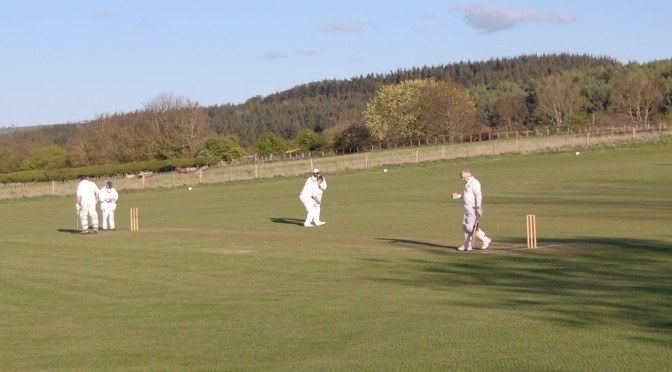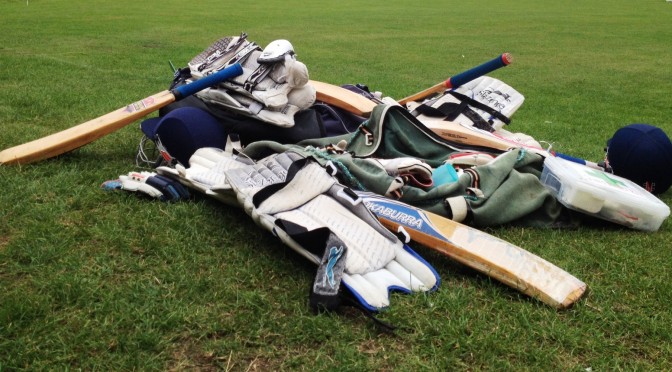After two days of heavy showers that felt more like autumn than late spring, the sun and a gentle breeze finally made an appearance and Mr Nitsch declared the pitch fit to play on – a magnanimous decision when considering that child-minding duties had relegated him to part-time spectator. With Excelsior looking for revenge after defeat in the opening fixture of the season, Wood strode out to the middle with opposing skipper Krishnan, duly lost the toss and Mallards were invited to field.
With Browne finally making an appearance, Wood had no hesitation in handing him the match ball to take the first over. Fears that Browne’s reluctance to partake in any sort of pre-season training might mean he was a tad rusty were allayed as he immediately hit his stride (notwithstanding the two consecutive wides, both well- taken by stand-in wicket keeper Wood). Dunhill also began tidily from the other end and the Excelsior opening batsmen had to settle for running singles. The pressure didn’t take long to tell and the first breakthrough came in the 3rd over with Browne (9 for 1 off 3) bowling the ever-dangerous Krishnan for 5, quickly followed up by Dunhill (13 for 1 off 3) removing the other opener Wilson for 2 via impact of the ball with middle stump.
At the end of the 6th over the score was roughly 24 for 2 (roughly because the score at the end of each over was not filled in in the scorebook – frustrated gnashing of teeth …). Wood rang the first change bowlers with McGuinness and Mexter taking an end each. Both bowlers bowled with remarkable symmetry, McGuinness going for a steady 6 every over (largely thanks to his uncanny knack of bowling 1 four ball an over) and Mexter leaking just a measly 3 runs every over. Mexter also secured the wicket of Woodhead, who was starting to take a real anchor role, with one that came back into the left-hander to hit the stumps removing him for 12. McGuinness should also have had a wicket had the wicket-keeper and short extra cover fielder Butcher managed to judge a skied ball rather than leaving it to each other – in the case of Wood self-preservation came ahead of fielding. (Editor’s note: Force equals Mass x Acceleration. Stig has a great deal of mass. And he called!)
With the score at roughly 48 off 12 overs, Wood invited Scott and Taylor to bowl at the death. With two big hitters at the crease in the shape of Spencer and Birrell, Scott bowled a tidy first over that would have been even tidier if Lucas, after a great stop on the boundary, had kept his foot inside the line when he picked the ball up.
Taylor at the other end, started with a couple of ropey wides as he found his radar only to finally get one right in the block hole that was dollied nicely into the safe hands of Scott at shortish midwicket. With the Excelsior batters clearly needing to put some more runs on the board, Birrell in particular took the mantle with 6s off both Scott and Taylor. However wickets were also being lost, Mexter hitting 1 and a half stumps from gully to run out Glenwright for a duck and Taylor getting a second wicket thanks to Wood’s sharp stumping of Bodley. With the last two overs only conceding 11 runs, Excelsior climbed to a gettable 94 from their 18 overs.
With Wood pooped from 18 overs of keeping, Butcher and Boyes opened the Mallards reply. The deceptively quick Glenwright opened the bowling for Excelsior and leaked just a single in the first over, while Bodley saw Butcher open his shoulders and find the first boundary. With a slow outfield and low-bouncing pitch boundaries where hard to come by as the score generally moved along in singles, with the notable exception of a fine glance to the backward point boundary by Boyes. After 4 overs, skipper Krishnan turned to spin, and was immediately rewarded with the wicket of Butcher bowled for 9 off his first ball by one that turned sharply from outside off-stump. At the end of the 6th over the score was 21 for 1, behind the run rate, but only a couple behind the Excelsior score at the same point.
With Scott joining Boyes the watchword was still singles though Scott briefly re-wrote the script by scoring his first ever competitive 6, a beautifully timed pull that cleared the boundary by 5 yards. Boyes’ focus on risky singles finally got punished as Scott (12) ran straight towards the clubhouse rather then the end of the wicket, so far short of his crease was he.
Lucas in at a lofty 4 and under clear instructions from the captain to “hit out or get out” clearly took the instruction to heart and was lucky to survive a very sharp diving caught and bowled by the highly agile Wilson, however not so Boyes, who perished to another caught and bowled from the same bowler two balls later for a steady 15. At the end of the 12th over the score was 50 for 3, ahead of Excelsior at the same stage but still well behind the required run rate.
Taylor made a swift 8, including a lovely straight driven four, only to be bowled by Wilson by one that turned sharply from outside off-stump and to his surprise clipped the bails. Wood, finally feeling sufficiently rested, came in at 6 and with boundaries looking decidedly distant elected to follow the Boysian strategy of quick singles and two’s – a policy not wholly welcomed by Lucas who, having scored freely, was run-out for 8 and Jordon run out for 4, possibly from exhaustion after being made to run a two. (His claims of being obstructed by the wicket-keeper were firmly rebuffed by the home umpire). With Excelsior bringing back their opening bowlers the required run-rate had crept up further, with 27 required from the last three overs. Some frantic running from Wood and McGuinness reduced this to 12 from the last over. McGuinness’s eventful innings almost ended when, having missed with a couple of attempted swipes he was clean bowled by Glenwright. Saved by umpire Taylor’s late no-ball shout, he repeated the shot with the same effect and exited for 2. This brought Mexter in with 11 needed off 3 balls. Unfortunately a 2 and a single from the next two balls left Wood requiring 8 from the final ball and the game was up. A final two left Mallards tantalisingly six runs short of victory on 89 for 7.
So Mallards 1, Excelsior 1 after two very close competitive games and mutterings that we should try and organise a decider. The new pay-for-food regime at the Wellington was more than compensated by sheer quantity and also helped by the fact that only the old (now retired) guard from the Excelsior team turned up the pub. (Editor’s note: The younger, fortunate-to-be-still-working teachers had rushed home to prepare their lesson plans, presciently fearing the biting cuts that were about to be imposed on them by a draconian government unbelievably returned by a lily-livered, cowering electorate.)










